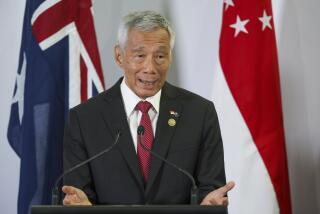Hong Kong Chief Tung Has Reportedly Resigned
- Share via
BEIJING — Beleaguered Hong Kong Chief Executive Tung Chee-hwa, whose unpopular leadership gave life to the territory’s pro-democracy movement, has resigned, according to local media reports.
A Chinese government spokesman declined to comment, as did Tung, 67, when questioned by reporters in Hong Kong today. But analysts said widespread media reports and the speculative fever sweeping Hong Kong would make it difficult for Tung to stay on and rule effectively.
“Over the past two days, everyone and their cousin has been talking about this,” said Christine Loh, head of Civic Exchange, an independent think tank. “Beijing has decided it’s less risky for them if Tung leaves early.”
Reports in the South China Morning Post, among other media outlets, said Tung would resign for health reasons, perhaps as early as next week. Any succession would probably see Chief Secretary Donald Tsang, Tung’s close aide, named on an interim basis pending the appointment of a formal successor.
Many Hong Kong residents said they were glad to read that Tung was leaving, given his generally ineffective record.
“He’s too old,” said K.C. Wong, 23, a violin teacher. “He can’t take the pressure of the job. He can’t solve Hong Kong’s problems.”
Analysts said it was not clear whether Tung had volunteered to resign or was forced out by China. Speculation about Tung’s departure has been rife after a recent announcement that he was being named vice chairman of the Chinese People’s Political Consultative Conference in Beijing.
“In Chinese, we call this sort of job an empty-vase position,” said Ong Yew-kim, an honorary research fellow at the Chinese University of Hong Kong.
Even Beijing, which has been publicly supportive of him for years, in recent weeks has stepped up its criticism of Tung. In a public rebuke, President Hu Jintao in December cited Tung’s poor performance, contrasting it with Macao’s strong leadership.
Hong Kong analysts said it appeared that some sort of succession plan had been hammered out behind the scenes.
“This is democracy Chinese-style,” Loh said. “The whole process is stage-managed, but what a show the mainland has put on for us.”
China experts said they respected Tung for taking on a difficult assignment, a tough economy and the SARS health crisis, but said his performance had fallen short.
Tung’s removal would demonstrate that “the Beijing government is very pragmatic by putting Hong Kong’s stability and development ahead of saving face,” said Wang Yukai, a professor at Beijing’s National School of Administration.
Tung, a Shanghai-born former shipping tycoon, was chosen by Beijing to lead Hong Kong when the British handed back the territory in 1997. He enjoyed a honeymoon period with Hong Kong’s 7 million residents. In his second term, however, he showed a penchant for gaffes, imperious statements and a lack of political savvy.
He stumbled during the 2003 crisis over SARS, or severe acute respiratory syndrome, when on several occasions he provided inadequate or speculative information that sparked panic.
In public, he appeared to bow to Beijing’s every wish, an approach that seemed to undermine his own authority.
The vast majority of Hong Kong residents accepts China’s right to rule. Tung managed over time, however, to awaken and fan people’s desire for greater autonomy. In July 2003 a pro- democracy demonstration drew 500,000 people, a flexing of muscle that shook up stability-minded Beijing.
Special correspondent Dirk Beveridge in Hong Kong and Yin Lijin in The Times’ Beijing Bureau contributed to this report.
More to Read
Sign up for Essential California
The most important California stories and recommendations in your inbox every morning.
You may occasionally receive promotional content from the Los Angeles Times.













